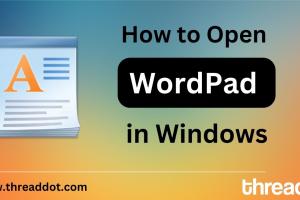Ultimate Guide: How to Easily Open WordPad on Windows 10

-
Quick Links:
- Introduction
- What is WordPad?
- Why Use WordPad?
- How to Open WordPad
- Method 1: Using the Start Menu
- Method 2: Using Run Command
- Method 3: Using Command Prompt
- Method 4: Using Windows Search
- Method 5: Creating a Desktop Shortcut
- Features of WordPad
- Troubleshooting Common Issues
- Expert Tips for Optimal Use
- Case Studies: Real-World Applications of WordPad
- Conclusion
- FAQs
Introduction
WordPad is a versatile and user-friendly word processor included in Windows 10. Unlike Microsoft Word, it offers basic text formatting features, making it ideal for quick notes and simple documents. In this guide, we will explore various methods to open WordPad in Windows 10, along with its features, troubleshooting tips, and expert insights.
What is WordPad?
WordPad is a free word processing application that comes with Windows operating systems. It allows users to create, edit, and format text documents with features such as font styles, colors, and basic graphics. While not as robust as Microsoft Word, WordPad is perfect for users who need a lightweight solution for text editing.
Why Use WordPad?
- Lightweight: WordPad uses minimal system resources, making it quick to open and use.
- User-Friendly: The interface is simple and intuitive, suitable for all skill levels.
- Cost-Effective: It is included free with Windows 10, which saves on software expenses.
- Basic Formatting: Users can format text, insert images, and create lists.
How to Open WordPad
There are several methods to open WordPad in Windows 10. Each method is straightforward and can be accomplished in a few simple steps. Below are the details of each method:
Method 1: Using the Start Menu
- Click on the Start Menu (Windows icon) located in the bottom-left corner of your screen.
- Type WordPad into the search box.
- Click on the WordPad app from the search results.
Method 2: Using Run Command
- Press Windows + R keys on your keyboard to open the Run dialog box.
- Type wordpad and hit Enter.
Method 3: Using Command Prompt
- Type cmd in the Start Menu search box and open the Command Prompt.
- In the command window, type wordpad and press Enter.
Method 4: Using Windows Search
- Click on the Search bar located next to the Start Menu.
- Type WordPad and select it from the results.
Method 5: Creating a Desktop Shortcut
- Right-click on the desktop background and select New > Shortcut.
- In the location field, type wordpad and click Next.
- Name your shortcut (e.g., WordPad) and click Finish.
Features of WordPad
WordPad comes with several features that enhance its usability:
- Text Formatting: Change font styles, sizes, and colors.
- Paragraph Formatting: Adjust alignment, indentation, and line spacing.
- Insert Images: Add images and graphics to your documents.
- Document Compatibility: Supports various file formats including RTF, DOCX, and TXT.
Troubleshooting Common Issues
While opening WordPad is usually a straightforward process, users might encounter some issues. Here are common problems and their solutions:
- WordPad Not Found: Ensure that WordPad is installed. You can reinstall it via Windows Features.
- WordPad Crashes: Check for Windows updates or try running WordPad in compatibility mode.
Expert Tips for Optimal Use
- Regularly save your documents to avoid data loss.
- Utilize keyboard shortcuts for faster editing.
- Explore the formatting options to enhance the presentation of your documents.
Case Studies: Real-World Applications of WordPad
WordPad has been effectively used in various scenarios, including:
- Students: For taking quick notes and writing essays.
- Small Businesses: For drafting invoices and reports.
Conclusion
Opening WordPad in Windows 10 is a simple task that can be accomplished through various methods. Whether you prefer using the Start Menu, Run command, or creating a shortcut, WordPad remains a valuable tool for quick and efficient text editing.
FAQs
- 1. Is WordPad free to use?
- Yes, WordPad is a free application included with Windows operating systems.
- 2. Can I save WordPad files in different formats?
- Yes, WordPad supports various file formats including RTF and DOCX.
- 3. What is the difference between Word and WordPad?
- WordPad is a basic text editor while Microsoft Word offers advanced features for document creation.
- 4. How do I uninstall WordPad?
- You can uninstall WordPad via the Control Panel under 'Programs and Features'.
- 5. Can I use WordPad for collaboration?
- WordPad does not support real-time collaboration like some other text editing applications.
- 6. Is WordPad suitable for professional documents?
- For basic documents, yes; however, for more complex tasks, Microsoft Word is recommended.
- 7. How do I change the default font in WordPad?
- Go to the 'Home' tab, click on the font drop-down menu, and select your desired font.
- 8. Can I insert hyperlinks in WordPad?
- Yes, you can insert clickable hyperlinks into your documents.
- 9. How do I print a document from WordPad?
- Click on 'File', then 'Print' to send your document to a printer.
- 10. How can I get help with WordPad?
- You can access the help feature within the application or search for tutorials online.
Random Reads
- Unblock websites
- Unblock youtube school
- Unblocking imessage
- How to zoom with a web browser
- How you can still use windows photo gallery today
- Quickly change color background photoshop
- Real vs counterfeit yu gi oh cards
- How to install ceiling drywall
- How to install ceiling tiles
- How to pack a water shutoff valve